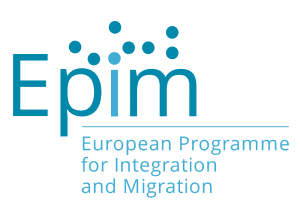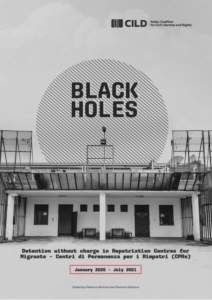Turning the tide of detention: what role could European cities play?
Written by Barbara Pilz and Jem Stevens
European cities are increasingly involved in debates around migration governance. What role could they play in building systems based on engagement with people, not enforcement and immigration detention?
Not just for national governments
Migration management is often thought of as the domain of national governments. But a group of European cities is highlighting their role in working with irregular migrants, producing guidance and bringing their voices to European-level policy making through the C-MISE exchange.
Something stands out about their work: these local level authorities focus on support and services for people without documents. A stark contrast to the enforcement, deterrence and detention approach increasingly popular among national governments in Europe.
Closer to the realities of irregular migration
Perhaps this isn’t surprising, as cities have competence in ensuring the welfare of residents and are closer to the realities of irregular migration. They witness first-hand the experiences of people without documents who often can’t access basic services and the challenges this brings for individuals, local communities and authorities.
In Athens, Eleni Takou of Human Rights 360 shares “Most people without documents end up in Central Athens, either under the radar or seeking onwards routes. This has meant Athens city has to be proactive – it has a coordination centre for NGOs and other stakeholders, and has been active in providing services and supporting referrals to housing and healthcare.”
Addressing local concerns: approaches that work better
Impoverishment, homelessness, destitution and barriers to social cohesion are some of the challenges cities face, linked with irregularity. People are often detained repeatedly and sometimes for prolonged periods, in violation of EU legislation. And when they are released from detention, with all the problems this brings, cities have to pick up the pieces.
So could collaboration among cities and NGOs provide another way, addressing local concerns while better ensuring rights and resolving cases in the community, without immigration detention?
Jan Braat of the City of Utrecht, who chairs the C-MISE exchange, thinks so: “In the Netherlands, 50% of people [in an irregular situation] end up on the streets – the national government’s approach hasn’t worked. We’ve shown that it’s better to build trust and work with people”.
Building trust, solving cases in Utrecht
Utrecht City partners with NGOs to provide professional guidance and support to people without documents, to reduce irregularity in the city. The programme has achieved case resolution for most its clients: since 2002, 59% of participants received legal status, 19% returned to their countries of origin, 13% re-entered national asylum shelters, and only 8% disengaged.
Rana van den Burg at SNDVU, an implementing NGO, tells us about their approach:
“The key to our support is that it’s based on trust between the contact person and the client. People often believe that their case hasn’t been looked at properly by immigration authorities, increasing distrust in the system and facilitating disengagement from the procedures”.
At SNDVU, a contact person accompanies each individual throughout the migration procedure and ensures they have access to clear and accessible information in order to make difficult decisions. Along with this professional guidance, the programme provides accommodation, pocket money, legal aid and social support so that people can meet their basic needs and actively participate.
Rana explains that “working together with people and having a judgement free attitude, while facilitating their agency and decision-making is the key to resolving cases”. The programme does not impose a time limit for participation, in order to give participants time to explore all options for case resolution. An agreement with the police means clients can’t be detained.
Growing evidence
While this approach is still innovative in Europe, there’s growing evidence that it works. Last year, an in-depth Council of Europe analysis found that trust and support, including individualised case management, are key to effective alternatives to immigration detention (ATD). Evidence from three NGO-run case management pilot projects in Bulgaria, Cyprus, Poland, backs this up.
NGOs are often well placed to implement case management ATD programmes, with expertise in working with one to one migrants and building the rapport necessary foster engagement. And as civil society organisations consider how pilot projects can be scaled up towards systems change, cities stand out as potentially important stakeholders.
Influential stakeholders
Not only do cities have the ability to mobilise services and support networks available in their community, as first responders, they can act as entry points to regional and national governments. Their voices could be influential in changing narratives around migration and detention.
From this year, for example, Utrecht’s professional guidance programme is receiving funding from the Dutch national government. This is part of an agreement with five municipalities which will provide 59 million EUR funding for pilots over three years (in Utrecht, Rotterdam, Amsterdam, Eindhoven and Groningen) – and has enabled Utrecht to expand its programme.
It’s significant that with this agreement, the Dutch national government has shifted away from an exclusive focus on returns which it doggedly maintained for years. Could this multi-level collaboration provide a step towards systemic change? For local NGOs, maintaining independent quality case management – which genuinely supports people to explore all options (rather than focusing on return) and make decisions in an informed and dignified way – will be key.
Meanwhile, the European Commission is engaging cities on irregular migration, rightly recognising that national governments can’t do this alone. The C-MISE cities have a refreshing message in this debate: they want to start a conversation acknowledging that EU policies should not disregard the social hardships lived by irregularly staying migrants and that more inclusive responses are needed.
Multi-level collaboration as a route to change
EU policy and national governments are increasingly relying on enforcement and detention to try to achieve migration management goals. But it’s well known that detention is not only harmful and costly, it does not promote case resolution.
In this challenging context, collaboration between cities and NGOs could develop approaches that treat people as human beings, supporting individuals to resolve cases in the community without detention.
For cities, this could provide a way to address local challenges, while informing and influencing national and European policy. For civil society, it could provide the building blocks for systems based on humanity and dignity that work better for everyone.
Shifting the narrative and practice on migration management – from enforcement to engagement – is a multi-level task that requires collective action.







